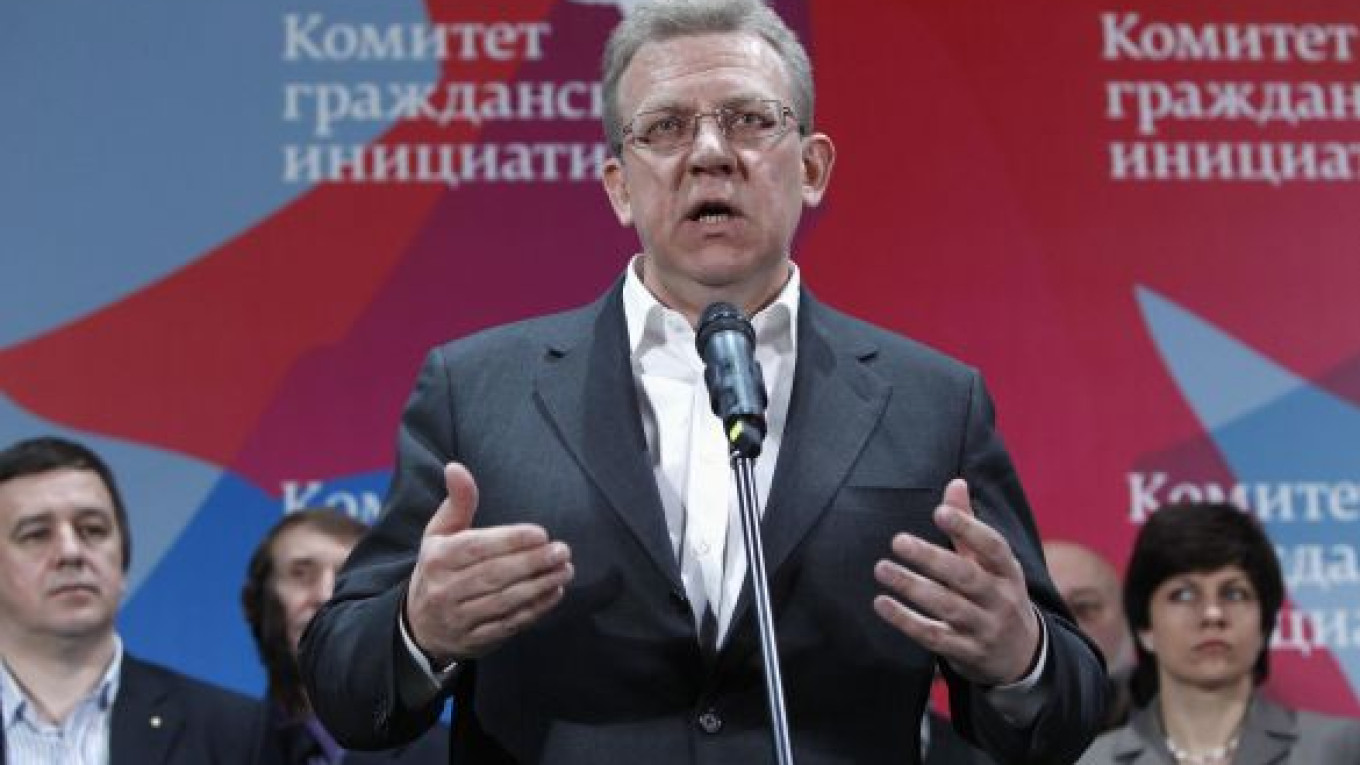Former Finance Minister Alexei Kudrin on Thursday announced that he and his allies created a group that is willing to challenge the government in defining the country's political and economic development.
Many members of that group — which brings together political analysts, economists, journalists and even one governor: Nikita Belykh — lined up to stand behind Kudrin as he made the statement at a news conference.
While alternatives to the government's policies openly circulated in the public domain before, Kudrin, who left a legacy of being one of the most respected and the longest-serving Cabinet members, could give these or new proposals more weight. The move is also set to raise his profile in matters other than finance.
"The recent elections showed that people want to get involved in finding solutions for the problems of society and choose the path for the country's development," Kudrin said. "We must help with the implementation of this task."
Reports of widespread vote-rigging during the State Duma elections in December provoked the largest post-Soviet street rallies in Moscow. Kudrin made a speech at one of them.
In addition to Kudrin and Kirov region Governor Belykh, the 37-member Committee of Civic Initiatives includes liberal political leader Leonid Gozman, economist Igor Yurgens, political think tank director Mikhail Dmitriyev and television personality Vladimir Pozner.
"We intend to openly oppose the actions of the authorities, regardless of names and offices," the committee said in a statement.
It stated that its goals include a better, independent judiciary; transparent budget procedures; and greater public oversight of the police.
"Pension reform has hit a snag, and the police has changed only on paper," Kudrin said, referring to some of the key attempts at improving government institutions over the past few years.
Kudrin said the committee could throw its weight behind certain candidates at future gubernatorial or mayoral elections.
He said he hasn't asked either Prime Minister Vladimir Putin or President Dmitry Medvedev for approval in setting up the committee. He added that he wasn't considering a return to a Cabinet position.
The committee will propose its solutions in the economic, social and political areas to the government, the State Duma and opposition parties outside the parliament, Kudrin said.
Mikhail Dmitriyev said on the sidelines of the news conference that the committee would also work with governors and mayors that might want any assistance.
The committee could help the federal and local governments in working out measures to reduce the staggering costs of road construction and maintenance, he said. On the local level, the committee's experts could help with nitty-gritty advice about how police could better patrol the streets, he said.
Russia has a number of think tanks, lobby and activist groups that have been offering their research and expertise in a wide range of issues. The novelty about Kudrin's group will be that "such a significant political leader and personality is at the head," said political analyst Dmitry Orlov, who is close to the Kremlin.
"It will have more weight," he said.
Alexei Makarkin, deputy director of the Center for Political Technologies, a think tank, said the committee gave Kudrin a chance to speak out not only on financial issues, where he is a professional, but also on politics.
"He's building up his personal capacity as a politician," Makarkin said.
The move shows that Kudrin gave up the idea of creating his own political party, apparently evaluating his electoral appeal to be between little or nothing, Makarkin said.
Kudrin gained respect in the investor community by exercising restraint in government spending and promoting liberal financial market regulations.
Putin repeatedly called him a friend even after Kudrin's ouster from the Cabinet. Medvedev fired Kudrin for his criticism of the Kremlin's plans for accelerating defense spending.
A Message from The Moscow Times:
Dear readers,
We are facing unprecedented challenges. Russia's Prosecutor General's Office has designated The Moscow Times as an "undesirable" organization, criminalizing our work and putting our staff at risk of prosecution. This follows our earlier unjust labeling as a "foreign agent."
These actions are direct attempts to silence independent journalism in Russia. The authorities claim our work "discredits the decisions of the Russian leadership." We see things differently: we strive to provide accurate, unbiased reporting on Russia.
We, the journalists of The Moscow Times, refuse to be silenced. But to continue our work, we need your help.
Your support, no matter how small, makes a world of difference. If you can, please support us monthly starting from just $2. It's quick to set up, and every contribution makes a significant impact.
By supporting The Moscow Times, you're defending open, independent journalism in the face of repression. Thank you for standing with us.
Remind me later.


